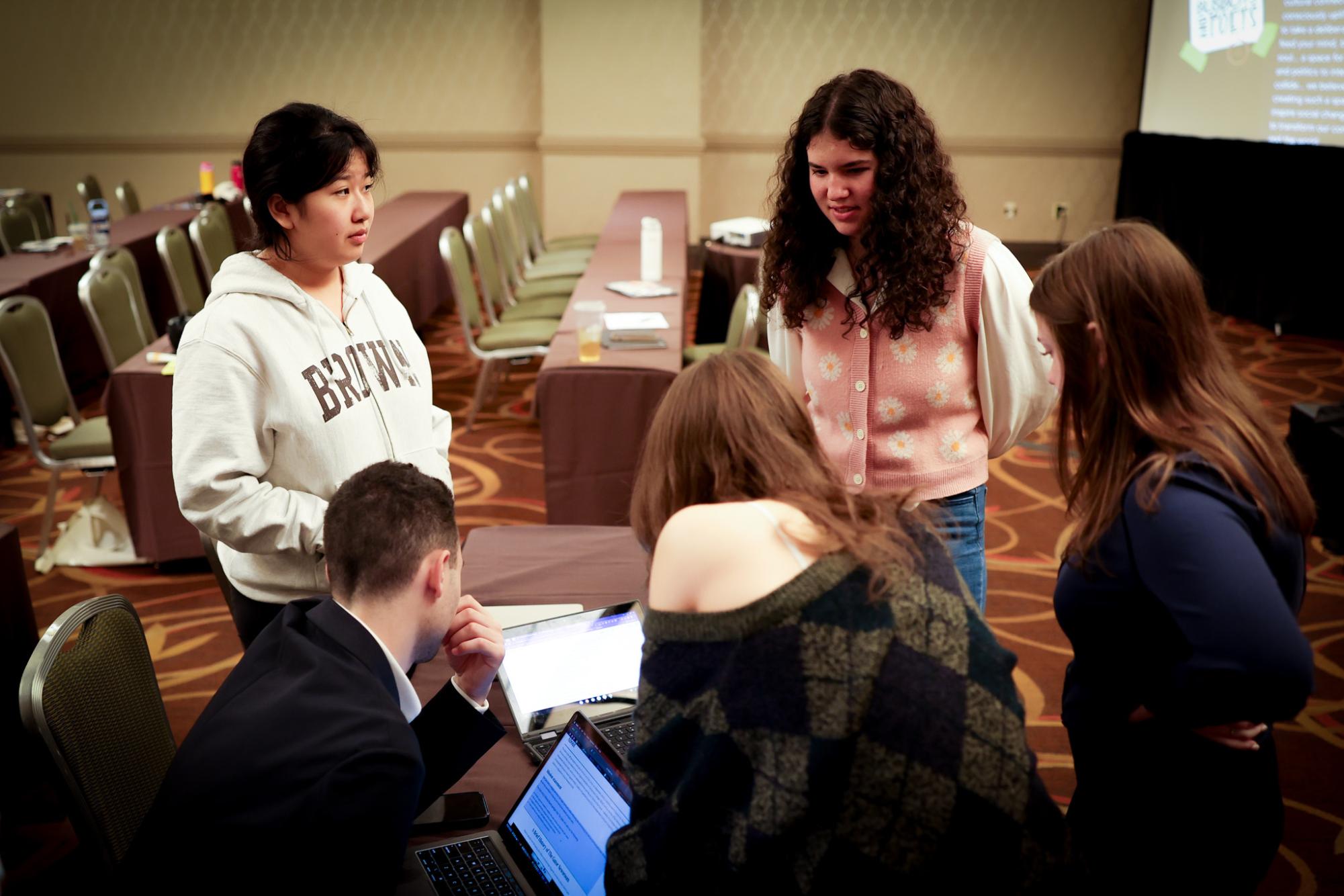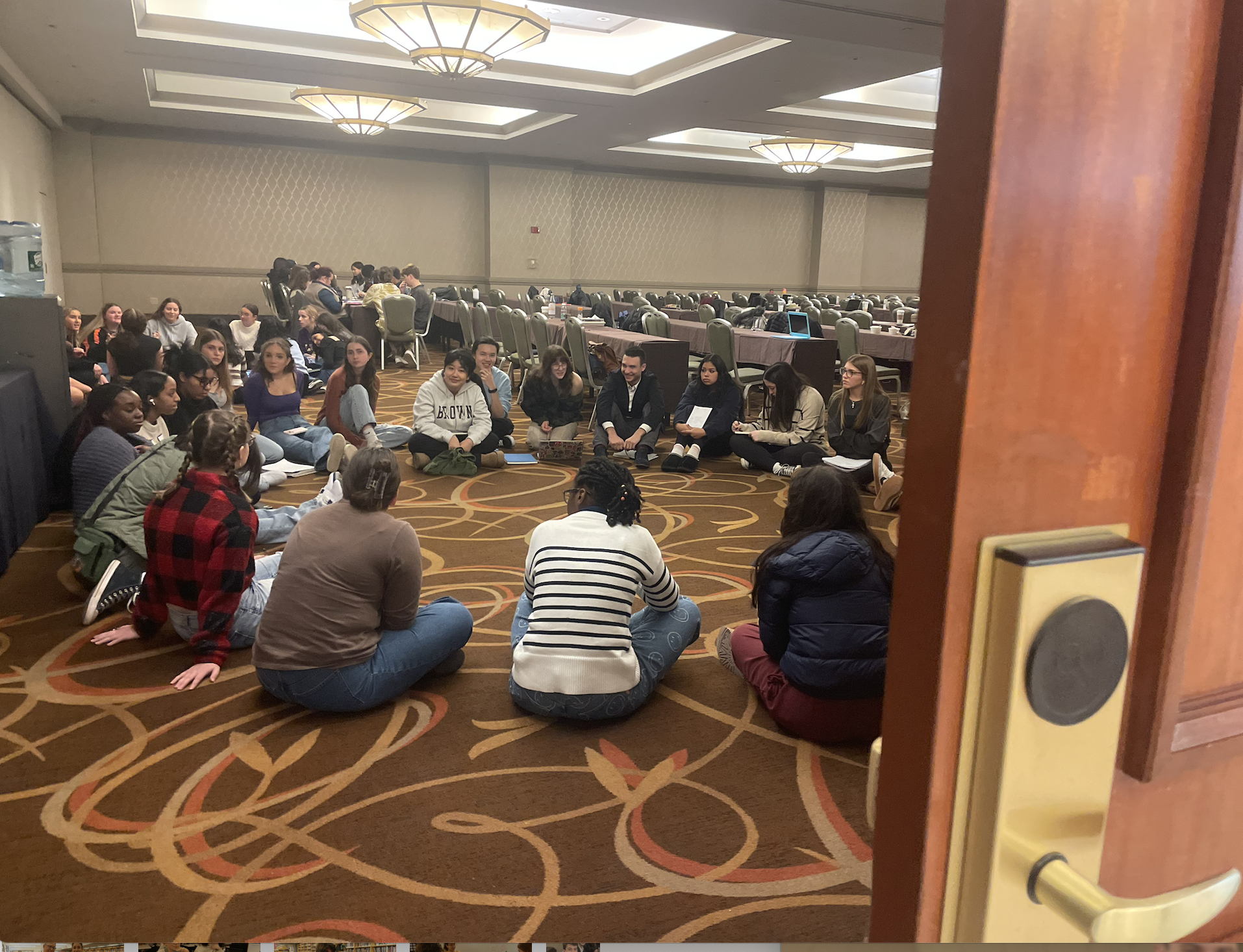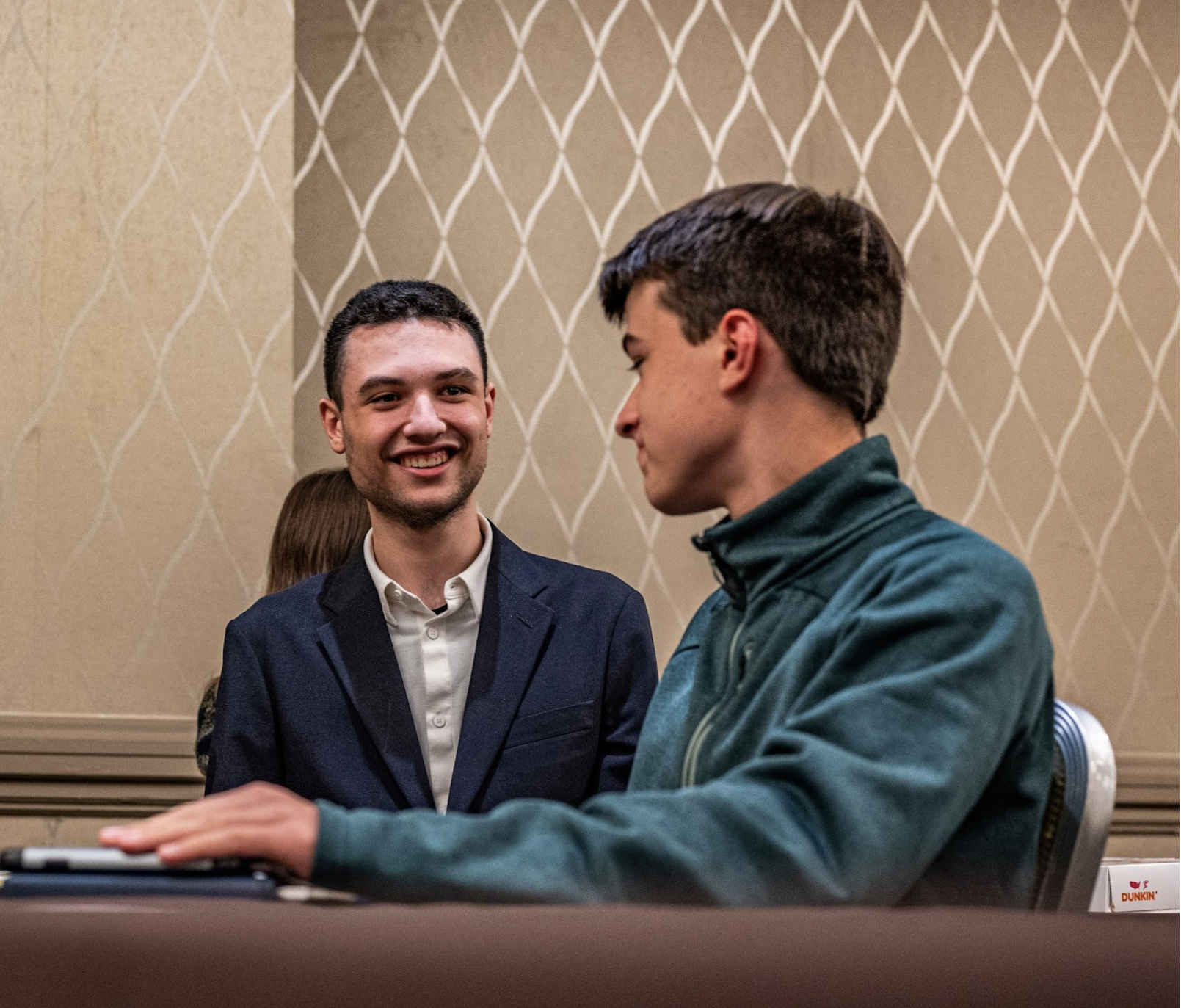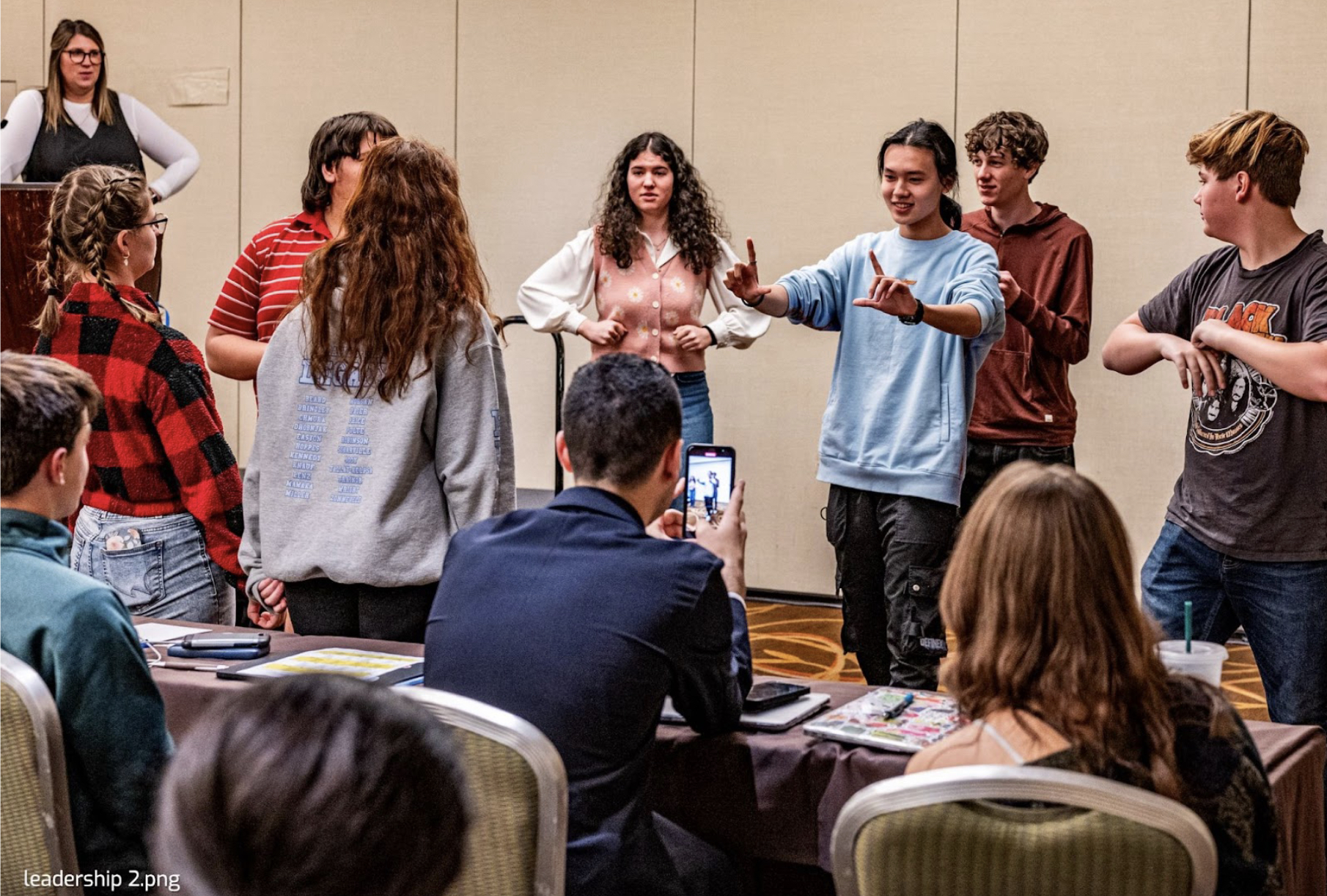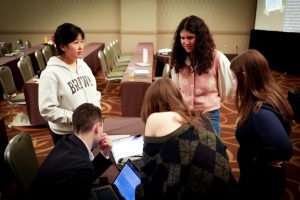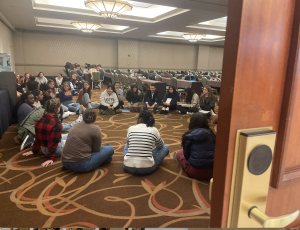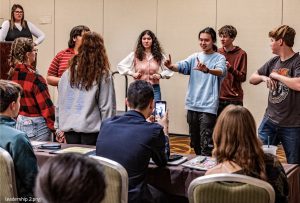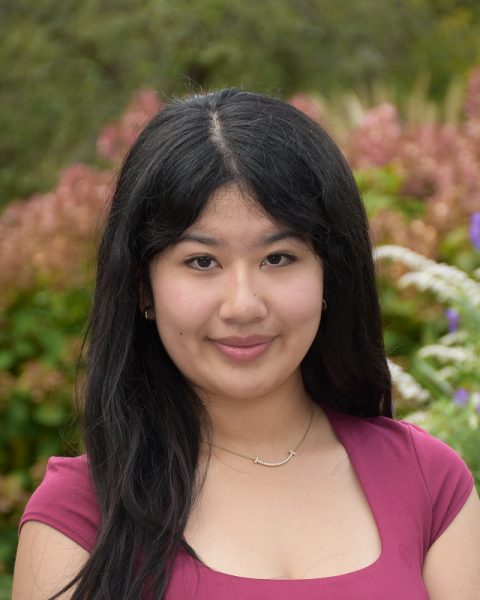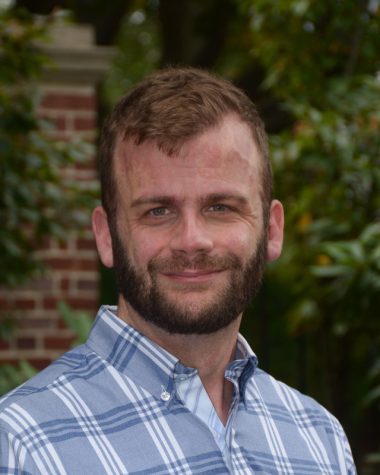How can an editor or a newsroom leader cultivate a successful staff culture? In what ways can journalists, especially highs school students, discover and timely and objectively cover stories? What unique powers do journalists possess, particularly those at the high school level?
Addressing these questions, the Fall 2023 JEA/NSPA National High School Journalism Convention, held from Nov. 2-5 in Boston, included a variety of instructional sessions, awards in scholastic media, keynote speeches by the Boston Globe Spotlight team, on-site media critiques, and a trade show dedicated to journalism education and professional resources.
Over four days, the Gator’s newsroom, alongside more than 4,000 attendees from school newsrooms across the country, participated in the event at the Hynes Convention Center. This gathering featured enriching discussions, motivational teachings, and an abundance of innovative ideas.
-
Senior Journalist Mary Wang ’25 engages in a learning activity with her peers and other student journalists .
-
Gator Adviser David Cutler takes a photogrpah as he passes he reporters at work.
-
Evan Michaeli ‘24 and Edward Flint ‘26 chat about leadership during the pre-convention workshop.
-
Senior Journalist James Yu and others participate in a game of charades. (JEA)
Leadership: Building a Successful Staff Culture
On November 2, fellow editors, senior journalists, and I participated in a pre-convention session to nurture successful staff cultures in our newsrooms. Carrie Faust from Smoky Hill High School in Aurora, Colorado, and Annie Gorenstein-Falkenberg from Longmont High School, Colorado, guided us. We embarked on a brainstorming exercise to identify areas for improvement. Using a ‘keep, stop, change’ chart, we effectively structured our ideas and plans.
We evaluated our writers’ strengths and identified areas for improvement. Collaboratively, we crafted a mission statement for The Gator, which we shared with pride with student editors nationwide. Additionally, we brought engaging activities, like the True Colors personality test, back to our newsroom. These activities, which we initially enjoyed as ice-breakers with other editors, including group charades, have played a key role in deepening our understanding and improving our newsroom’s dynamics.
The convention was highly effective in enhancing our newsroom’s leadership system and, more importantly, in forging a bond between the editors and senior writers. Our time on Thursday was filled with productive conversations and enjoyable activities, which served to establish a tighter-knit relationship among us.
Co-Executive Editor Cathy Wu ’24, who also attended the workshop, agrees.
“I was very grateful for the opportunity to get to know journalists across the world,” Wu said. “I learned a lot from my peers; we built a deeper connection in our editorial board and with senior journalists as well.”
With Great Power Comes Great Responsibility
That next day, I walked with uncertainty into a session titled “Making a Difference.”
Presented by Jeanne Acton, a retired journalism adviser from Austin, Texas, it promised insights into impactful journalism. I harbored doubts, questioning whether it would be another long, tedious speech or a cliché-laden lecture about the power of language. The session’s motto resonated with me: “Journalism matters. You matter. And what you do in your newspaper matters. Do journalism that makes a difference, that gives a voice, that shows a story. Let’s talk about how you use your journalism powers for good.”
Surprisingly, within just five minutes, I found myself thoroughly captivated by the instructor’s slides, dispelling my initial skepticism.”
“With great power comes great responsibility,” Acton said.
As young journalists, we possess immense power to amplify voices, especially in critical times like the COVID-19 pandemic. During such periods, stories crafted by journalists were pivotal in spreading awareness and truth about the crisis. Without journalism, our world would lack essential insights and understanding.
Then, the instructor highlighted journalists who had dared to confront issues others shied away from. I was struck by the example of Tom Fox, a Dallas Morning News reporter. His bravery shone through when he took photos of a shooter during an active shooting incident, alerting hundreds who might otherwise have been in danger. Equally astonishing was the story of John Moore, who traveled to Liberia to photograph children orphaned by the Ebola outbreak. These examples demonstrated the profound impact and courage in journalism, leaving a lasting impression on me.
His photos, once published in the New York Times and Washington Post, were pivotal in bringing aid to those isolated areas. He illuminated the dark, unseen corners of the world, making the invisible visible. I deeply admire these journalists for their courage in spotlighting those on the margins. Feeling fortunate, I reflected on how our own newsroom encourages us to speak up and make a similar impact.”
As high school journalists, we possess unique perspectives that are distinctly our own. We give voice to our peers and bring visibility to the issues within our community. This role empowers us to be both representatives and narrators of the world around us, seen through the lens of youth and vigor.”
Secrets to Great Storytelling
On Friday afternoon and Saturday morning, I participated in sessions centered on story writing. These sessions illuminated the subtleties of expressing my own perspective compared to others’. They highlighted the importance of ‘show, don’t tell’ in journalism, an essential technique for vividly conveying stories to audiences.
During an opinion-writing session led Gator Advisor David Cutler and Co-Executive Editor Evan Michaeli ’24, I gained a deeper understanding of how our newsroom elevates our opinion stories—especially by including striking visuals and elements of news reporting. This session also provided a valuable opportunity to learn from the experiences and approaches of other Op-Ed writers present in the room.
At the convention’s close, I proudly shared the spotlight with Michaeli. Our story, Pollution: Undermining Our Planet’s Health, secured a top-10 spot nationally in Local Climate Change Reporting-of-the-Year.
This recognition underscores journalism’s potency in raising environmental awareness and driving positive change. Although the top prize eluded us, we departed with heads held high, our impactful work celebrated on a national stage, reaffirming our dedication to storytelling for a better world.
Overall, my experience at NHSJC was special in a variety of ways: it provided me with the chance to get closer with other leaders in the newsroom, introduced me to the great powers of scholastic journalism, and taught me ways to compose a powerful story. It was a convention like no other—and will continue to impact my journey as a high school journalist at The Gator.



